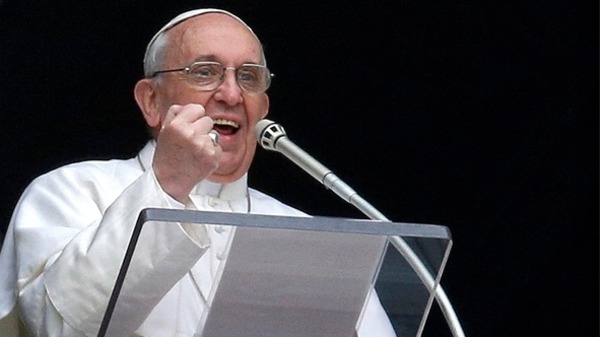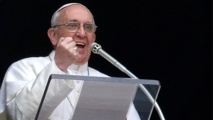Humans, their dignity and respect for the common good should be at the centre of all political, social and economic action, the 80-year-old pontiff added.
The Vatican played a decisive role in the negotiations between the government and left-wing FARC guerrillas, which began in 2012 and concluded with the peace agreement reached last year.
Just prior to the pope's visit, the government and the National Liberation Army (ELN) rebel group agreed to a ceasefire from October 1 until January 12. The announcement has raised expectations that the ELN will also sign up to a peace agreement soon.
Speaking to Colombia's bishops Thursday evening at the Cardinal’s Palace, Pope Francis quoted Colombian writer Gabriel Garcia Marquez, recipient of the Nobel Prize for Literature, who wrote that it is easier to begin a war than to end one.
"All of us know that peace calls for a distinct kind of moral courage," Francis said, according to a transcript of his speech provided by Vatican Radio. "War follows the basest instincts of our heart, whereas peace forces us to rise above ourselves."
Earlier Thursday, Colombian President Juan Manuel Santos described Colombia as "the country that exchanges arms for words."
Francis arrived Wednesday in the Colombian capital Bogota for his long-awaited visit, the third by a pope to the South American country. An estimated 80 per cent of Colombians are Roman Catholic.
During his visit, which will last until Monday, the pope is focusing his message on peace and reconciliation as the country works through a peace process.
Several million people are expected to turn out for his stops in the former conflict zone Villavicencio as well as in Medellin and Cartagena. Nearly 35,000 police and soldiers are protecting the pope during his visit.
Among the expected participants in a mass scheduled to take place at 9:30 am (1430 GMT) Friday in Villavicencio are 6,000 victims of the more than 50-year conflict between the government and FARC.
Although FARC's 6,800 former fighters have turned their weapons over in a demilitarization overseen by the United Nations, peace in Colombia remains fragile. FARC's demise may lead other violent groups to take control of drug trafficking, and there are fears of revenge attacks on former rebels.
At least 220,000 people died in an armed conflict between 1958 and 2012, which pitted left-wing militias against the military, police and right-wing paramilitaries, according to Colombia's National Centre for Historical Memory. Almost 7 million Colombians were forced to leave their homes due to the conflict, according to the UN.
FARC last week unveiled its new political party. It has changed its name to Alternative Communal Revolutionary Forces, but plans to keep the acronym FARC.
------------------------------------------------------------------------------------------------------------------------
The Vatican played a decisive role in the negotiations between the government and left-wing FARC guerrillas, which began in 2012 and concluded with the peace agreement reached last year.
Just prior to the pope's visit, the government and the National Liberation Army (ELN) rebel group agreed to a ceasefire from October 1 until January 12. The announcement has raised expectations that the ELN will also sign up to a peace agreement soon.
Speaking to Colombia's bishops Thursday evening at the Cardinal’s Palace, Pope Francis quoted Colombian writer Gabriel Garcia Marquez, recipient of the Nobel Prize for Literature, who wrote that it is easier to begin a war than to end one.
"All of us know that peace calls for a distinct kind of moral courage," Francis said, according to a transcript of his speech provided by Vatican Radio. "War follows the basest instincts of our heart, whereas peace forces us to rise above ourselves."
Earlier Thursday, Colombian President Juan Manuel Santos described Colombia as "the country that exchanges arms for words."
Francis arrived Wednesday in the Colombian capital Bogota for his long-awaited visit, the third by a pope to the South American country. An estimated 80 per cent of Colombians are Roman Catholic.
During his visit, which will last until Monday, the pope is focusing his message on peace and reconciliation as the country works through a peace process.
Several million people are expected to turn out for his stops in the former conflict zone Villavicencio as well as in Medellin and Cartagena. Nearly 35,000 police and soldiers are protecting the pope during his visit.
Among the expected participants in a mass scheduled to take place at 9:30 am (1430 GMT) Friday in Villavicencio are 6,000 victims of the more than 50-year conflict between the government and FARC.
Although FARC's 6,800 former fighters have turned their weapons over in a demilitarization overseen by the United Nations, peace in Colombia remains fragile. FARC's demise may lead other violent groups to take control of drug trafficking, and there are fears of revenge attacks on former rebels.
At least 220,000 people died in an armed conflict between 1958 and 2012, which pitted left-wing militias against the military, police and right-wing paramilitaries, according to Colombia's National Centre for Historical Memory. Almost 7 million Colombians were forced to leave their homes due to the conflict, according to the UN.
FARC last week unveiled its new political party. It has changed its name to Alternative Communal Revolutionary Forces, but plans to keep the acronym FARC.
------------------------------------------------------------------------------------------------------------------------









 Home
Home Politics
Politics











